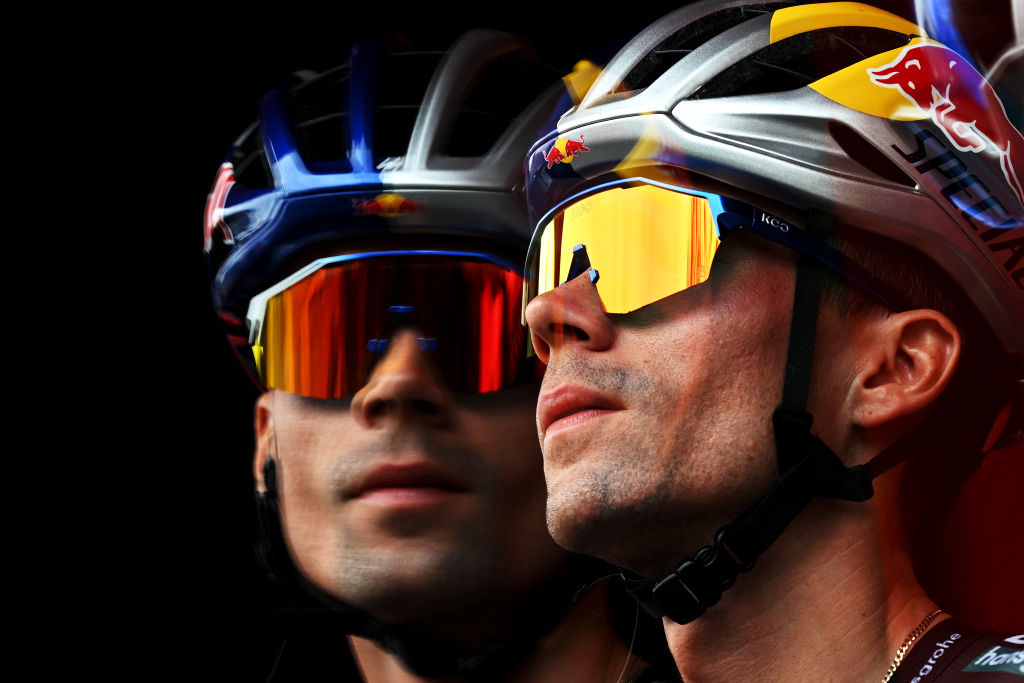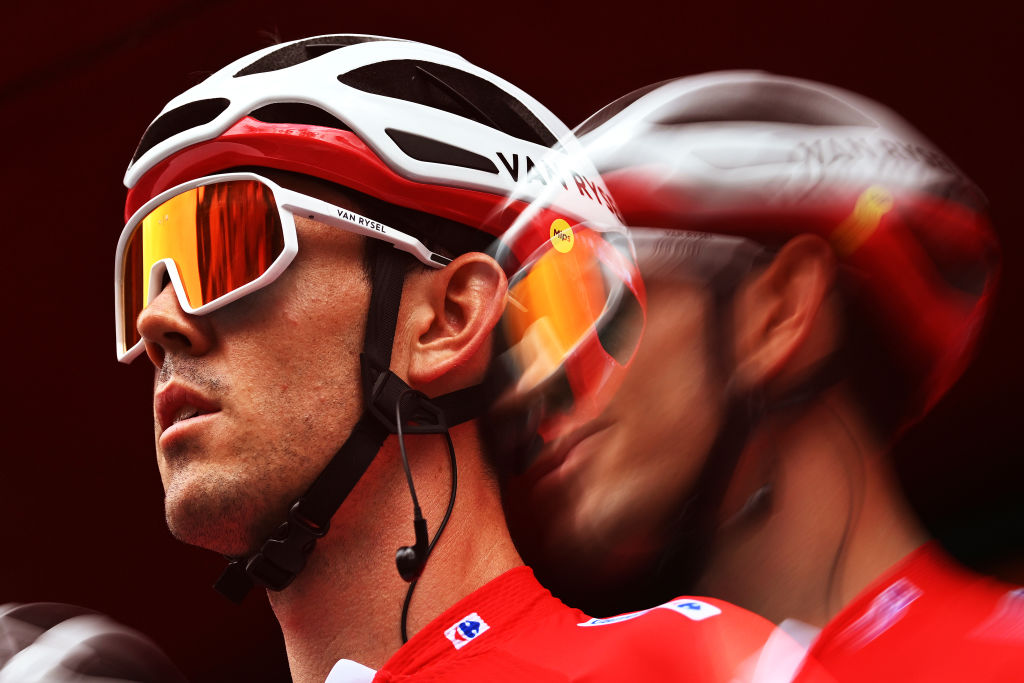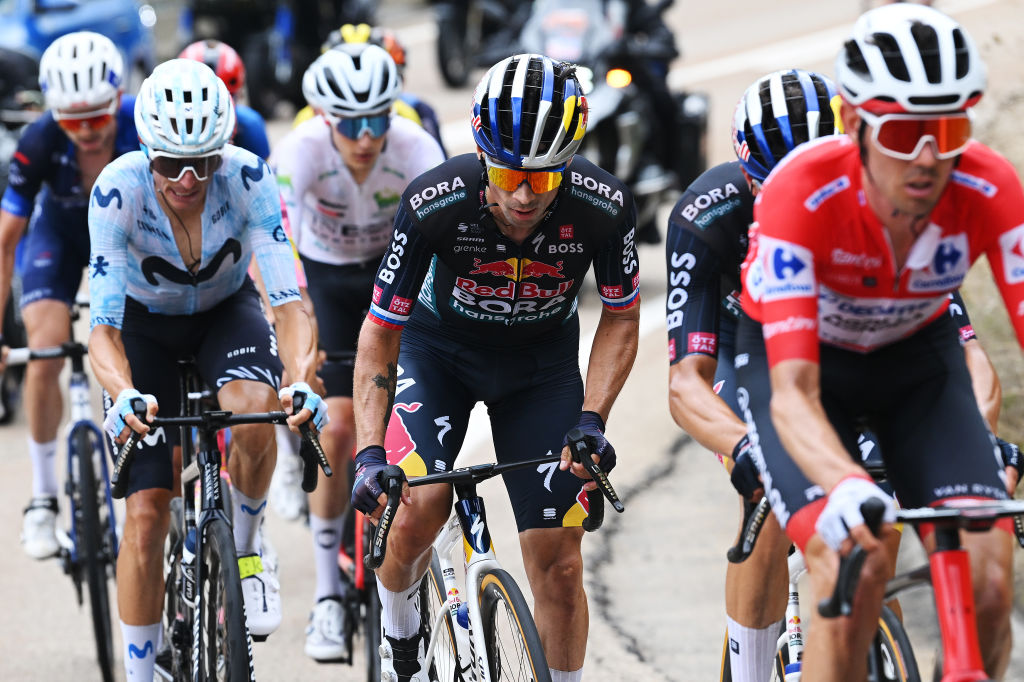
It wasn't surprising that the Vuelta a España ended with Primož Roglič on the top step of the podium.
When Ben O’Connor took the race lead on stage six with a winning breakaway attack, only Roglič remained as a serious threat and he began the daily process of wearing the Australian down.
Roglič might be criticised for being robotic at times but he has always shown he has the capability to be patient and wait for the right moment to strike. With the last week containing three mountain top finishes and a flat final time trial in Madrid, his GC rivals were always going to have an almost impossible task.
The Vuelta a España was always Primož Roglič's to lose but yet again, he went out and won it on merit.
At the start of the third week, Roglič failed to take the leader's red jersey on the Lagos de Covadonga summit finish but that wasn’t such a bad thing. O’Connor fought to retain an advantage of just five seconds and in doing so spared Roglič all the podium and other race responsibilities that go with the race lead.
That Enric Mas and Richard Carapaz weren’t able to distance the Slovenian was more icing on that day’s cake, making it a pivotal day of the race.
They were all slowly grinding their way to the podium places but their ambitions ended there. Only Roglič was sure to deliver a time trial performance which could overhauled the Australian. That meant Red Bull became the de facto GC leader team, with Movistar and EF Education assuming the role of aggressors.
Fast forward to Friday and the Alto de Moncalvillo finish confirmed the final week's narrative.
Carapaz and Mas had their chance to properly undo O’Connor, to stick in the knife and secure the podium spots. Yet instead of them taking the initiative when the climb hurt with five kilometres to go, Dani Martinez and Alexandr Vlasov were in charge and launched Roglič to victory.
Mas tried and blew after holding Roglič in sight for a while but at the line he gained less than a minute on O’Connor. Carapaz was 13 seconds slower than the Movistar leader who, we should remind ourselves, had come here hoping to improve on his previous runner-up spots.
The final mountain finish at Picón Blanco and the other climbs of the Queen stage looked set decide the podium. Roglič was in charge on set for victory but only a minute separated second placed O’Connor and Carapaz in fourth.
Mas and Carapaz needed to a minute ahead of O'Connor before the final time trial but the Australian turned the tables on them with another gutsy and defiant ride.
In the third week Roglič knew he could pull back enough time on O'Connor to win the Vuelta but Mas, Carapaz & Co were relying on the Australian's collapse. They had a weak hand in a game of poker and bluff.
It was as if they had forgotten this was a guy who had been fourth at the Tour and the Giro. The final time trial proved O'Connor consistency and grit and the Australian beat both of them to secure his second place.
The Madrid podium of Roglič, O’Connor and Mas perfectly respected the hierarchy of the race, and it reflected how each of them rode over the three weeks.
For once Roglič had no major crashes or disaster days, his average moments were good enough to stay with his rivals and his good days blew them away.
In pursuit of Ben O'Connor

O’Connor reminded us of his talent with second overall and thirteen days in the red leader's jersey saw him grow in confidence and stature.
At first, being slightly surprised and by the end much more aware of what it takes to fight for a Grand Tour win.
He showed a level of professionalism and respected Decathlon AG2R support even though he’s off to new pastures next year. The French team paid him back with their own loyalty and enthusiasm and so both celebrated.
For Movistar and Enric Mas, there was yet again an air of what might have been. They, and others, made a mistake on stage six by allowing O’Connor to build such a large lead an never recovered from that.
Ultimately Mas only had one super day at Cazorla on stage 8 when he was outsprinted by Roglič. He showed more aggression than usual but he and Movistar still weren’t ambitious enough.
Carapaz and his EF Education squad were probably just happy to be involved in the GC battles again after all his injuries and disappointments. It had been two years since he lost the Giro d'Italia to Jai Hindley.
Carapaz had always climbed well, and won the polka-dot jersey at the Tour de France this year but injury and illness meant there was a lack of consistency in his form. That was still visible at the Vuelta but he ground out a result. his fourth place was as much about determination as it was experience.
When you are riding the GC at a Grand Tour, you need to be present each day but you also need to win a stage, otherwise the feeling of disappointment lingers. We saw that in the top ten of this Vuelta. Only Roglič and O’Connor won stages, none of the others had those brilliant days or emerged from the GC shadows.
Adam Yates briefly flirted with the GC battle then fell away, which summed up UAE Team Emirates’ race after Joäo Almeida abandoned due to COVID-19. The team still had a successful Vuelta with three stage wins and the mountains classification with Jay Vine but his internal battle with Marc Soler created more headlines than anything else. There must have been some interesting discussion on the team bus during the final week.
Visma-Lease a Bike losing Wout Van Aert in a nasty crash changed the points and the mountain classifications in the final week but only the latter really opened up. Kaden Groves inheriting the green jersey was justified by him winning three stages, so Alpecin Deceuninck largely met their objectives.
The biggest surprise of the 2024 Vuelta was, of course, Kern Pharma also winning three times – twice with revelation Pablo Castrillo then in the last week up popped Urko Berrade on stage 18. Castrillo was a regular in the breakaways and then beat Alexandr Vlasov after a long day surrounded by much more experienced climbers.
The good, the bad and a need for a more humane race route

This Vuelta provided plenty to enjoy and be happy about: Roglič not having any bad luck, the O’Connor revival and Wout van Aert back at his best before his unfortunate departure.
It also had plenty of disappointments too: Mikel Landa (Soudal Quick-Step) looked strong at the start but fell by the wayside in the last week which is the complete reverse of his usual results.
Normally he would lose time early on and get better as the last days approached but here he had his bad day with three stages to go. He didn’t fall asleep at the back of the group or get caught in someone else’s crash, he just didn’t have the legs.
In contrast, David Gaudu (Groupama-FDJ) got better as the race went on. He was invisible in the first half but then emerged in the last week and that was also the opposite of his usual Grand Tour form. Did it inspire Stefan Kung to finally win a Grand Tour stage in the Madrid time trial? We will never know but it will certainly have eased the tension at Groupama-FDJ after a poor 2024.
The rise of Mattias Skjlemose has to be reassuring for Lidl-Trek. It was another Young rider classification for the Dane, comfortably inside the top ten for the majority of the race and jumping over Gaudu in the last time trial. Skjlemose also won the best young rider's white jersey ahead of Florian Lipowitz (Red Bull-Bora-Hansgrohe) and Carlos Rodriguez (Ineos Grenadeirs).
Steady progress indeed and that brings me to the plight of Britain's Max Poole of DSM Firmenich PostNL. He was often in big breaks, took a second-place, three third-pace and third overall in the points competition. It can’t be long until he wins big somewhere.
Sadly we have to take note that Ineos Grenadiers woes continue.
Any likelihood of a stage win in such a mountainous Vuelta was on the shoulders of Rodriguez who hovered around six or seventh overall until he fell apart on the penultimate day and tumbled down to 10th place. The team’s best result after three weeks was a fourth place from Jhonatan Navraez on stage 11.
The Vuelta also has to ask itself if making the route more mountainous than the other Grand Tours is achieving the desired effect.
Yes it produces spectacular landscapes and it sparked some surprises, but surely a late summer Vuelta could benefit from more varied terrain, a more balanced, more humane route.
Steeper and harder doesn't necessarily make for good racing.
Stage six from Jerez to Yunquera was the case in point. It had one climb which went above 1,000 metres, it wasn’t high altitude or up a repurposed goat track. It was just up and down and so difficult to control. It was the most influential day of racing. O'Connor on and took the race lead, writing the script for the final week and Roglič's two-week pursuit of victory.







